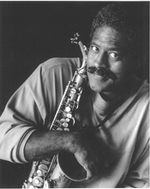
Saxophonist Charles McPherson Remembers The Sound That Mad Perfect Sense.
By Dave McElfresh
WHILE THERE ARE plenty of aging jazzers embarrassingly
wistful about the good old days, their sloppy sentimentalism doesn't
mean that previous eras didn't offer a helluva lot more jazz than
we're currently given.
 "Back in the early '50s" recalls alto saxophonist Charles
McPherson regarding his youthful days in Detroit, "I was
in this candy store that had a jukebox, and I saw the name Charlie
Parker and put a nickel in, wanting to hear this guy. It was a
cut off South Of The Border. I was about 14 years old."
"Back in the early '50s" recalls alto saxophonist Charles
McPherson regarding his youthful days in Detroit, "I was
in this candy store that had a jukebox, and I saw the name Charlie
Parker and put a nickel in, wanting to hear this guy. It was a
cut off South Of The Border. I was about 14 years old."
You don't have to be a bitter old fogey to miss a time when a
commercial form of musical entertainment offered something more
substantial than anything currently found flipping the entire
span, west-to-far-east, of the radio dial--let alone the limited
selections of the local bar's jukebox.
But a barely teenaged McPherson lived in a community that had
already made him surprisingly familiar with jazz.
"Parker didn't sound that revolutionary to me," he
remembers, regarding his introduction to probably the most radical
innovator in jazz history. "I didn't know anything about
the genres, the differences between swing and the other, later
styles. It was all jazz to me. But I remember the overwhelming
feeling I had when I heard Bird. I felt this was the way it should
go. It made perfect sense. All the notes that he played connected
up right, fit together like well-constructed sentences. I could
sense the melodic logic in his lines."
And McPherson wasn't the exception.
"A lot of kids were into Charlie Parker back then. It was
kind of a poor neighborhood bordering on a middle-to-upper-class
black neighborhood. Most of the kids liked doowop better, but
there was a hub of totally different kids, smarter kids--both
bookwormish nerds and real hipsters, not necessarily the egghead
type--who were equally touched by the urgency and virtuosity of
bebop."
McPherson's passion for jazz led him to study with jazz pianist
Barry Harris from age 15 to 20.
"Harris had some very interesting concepts about harmony.
He was kind of a guru in Detroit. I remember Coltrane coming by
his house--every day was a musical day for anyone visiting him
who was coming through town."
McPherson's next advance was even more significant.
"I hooked up with bassist Charles Mingus through Yusef Lateef.
In 1959 we played some afternoon jam sessions at a placed called
Cafe Wha?, a little coffee shop in Greenwich Village, along with
players like tenor saxophonist Booker Ervin. Mingus had heard
of me through Lateef, and was in need of a trumpet and saxophone
player. Eric Dolphy and Ted Curson were working with Mingus and
were going to quit in order to start their own groups, so Mingus
heard Ervin and me and hired us."
 McPherson worked with the temperamental Mingus off and on for
12 years.
McPherson worked with the temperamental Mingus off and on for
12 years.
"Mingus was hard to play with," the altoist admits.
"He was very exacting and pretty much the taskmaster. He
wrote in a very complicated manner because he was a complicated
person, but I learned a lot from him, especially in terms of composition."
McPherson's reputation as a Charlie Parker adulator led him to
Clint Eastwood.
"I was called by Lennie Niehaus, Eastwood's musical director.
I sent him a tape and we got together for the soundtrack of Bird.
There were some scenes where I was replicating Charlie Parker
because they couldn't use Bird's music for whatever reason. Bird
is certainly my main influence, so it wasn't like I had to change
a lot."
McPherson, though, is not living off his reputation as a bebop
replicator. On the heels of his appearance at Tucson's annual
Jazz Sundae, he'll return to New York for an extremely prestigious
gig: Lincoln Center commissioned him to write a program of original
music, which he'll perform in mid-October. In spite of the minimal
amount of attention currently given to jazz--certainly none is
currently to be found on a jukebox--the altoist does not believe
that the future of the music is reliant on a heightened degree
of exposure.
"Young people who are so inclined will find the music. Some
little kid is going to search the radio and say, stop right there,
what's that? Just like I did. So I feel confident that jazz will
always be a part of the global fabric of music. It might always
be esoteric music, but it's not going to go away."
Charles McPherson headlines Jazz Sundae XXI, Tucson
Jazz Society's annual free concert, at 7 p.m. Sunday, October
11, at the Reid Park DeMeester Outdoor Performance Center, Country
Club Road north of 22nd Street. Lawn chairs and blankets are recommended
for festival-style seating on the lawn. For recorded information,
call 743-3399.

|





